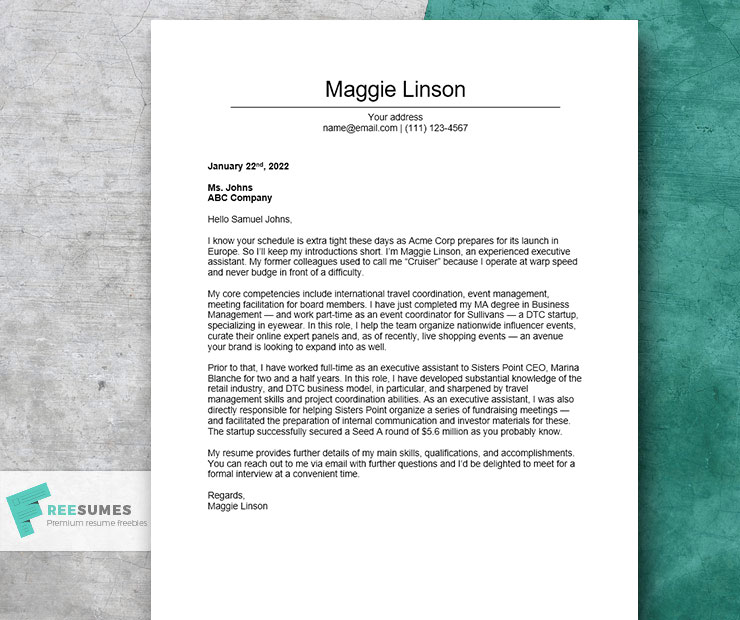Executive assistants are employed by a variety of industries — from tech to film production. It’s a dynamic, high-pressure role, requiring top-notch organizational skills, strong interpersonal skills, and mental resilience. At the same time, it’s also a well-compensated role. Proficient executive assistants to CEOs (or similar roles) can receive up to six figures in annual compensation.
That being said, the best executive assistant jobs are highly competitive. Not only do you need to demonstrate high digital literacy, excellent time management abilities, and general business acumen — but also display an array of soft skills, ranging from written and spoken communication, to conflict management and negotiations.
To help you effectively showcase such a wide range of skills, we’ve prepared a working example of an executive assistant cover letter, follows by some bonus writing tips!
Cover Letter Example for an Executive Assistant (Word version)
Below is a working example for an executive assistant, applying to work for a c-suite member in a startup.

Sample Cover Letter for Executive Assistant (text version)
Hello Samuel Johns,
I know your schedule is extra tight these days as Acme Corp prepares for its launch in Europe. So I’ll keep my introductions short. I’m Maggie Linson, an experienced executive assistant. My former colleagues used to call me “Cruiser” because I operate at warp speed and never budge in front of a difficulty.
My core competencies include international travel coordination, event management, meeting facilitation for board members. I have just completed my MA degree in Business Management — and work part-time as an event coordinator for Sullivans — a DTC startup, specializing in eyewear. In this role, I help the team organize nationwide influencer events, curate their online expert panels and, as of recently, live shopping events — an avenue your brand is looking to expand into as well.
Prior to that, I have worked full-time as an executive assistant to Sisters Point CEO, Marina Blanche for two and a half years. In this role, I have developed substantial knowledge of the retail industry, and DTC business model, in particular, and sharpened by travel management skills and project coordination abilities. As an executive assistant, I was also directly responsible for helping Sisters Point organize a series of fundraising meetings — and facilitated the preparation of internal communication and investor materials for these. The startup successfully secured a Seed A round of $ 5.6 million as you probably know.
My resume provides further details of my main skills, qualifications, and accomplishments. You can reach out to me via email with further questions and I’d be delighted to meet for a formal interview at a convenient time.
Regards,
Maggie Linson
How to Write a Cover Letter for an Executive Assistant
Executive assistants are valued for their strong communication skills and efficiency in getting the message across. So your cover letter must demonstrate both of these. To make a strong first impression, cut it straight to the chase and focus on communicating what you can do for the board member you’d be supporting. It also pays off to stay on the shorter side of things, especially if you are messaging a busy c-suite member directly (rather than the HR team).
The next tips should help you craft a winning executive assistant cover letter.
Make a Strong Opening
The opening lines of your cover letter will set the tone for the follow-up narrative. Don’t be timid or gibbering. Instead, adopt a confident, composed, and proactive tone. Start with a very short introduction and state the purpose of your letter. Then launch straight into “offense” and show off your most marketable skills.
Skip the lengthy courtesy statements such as “I’m sending this letter in reference of your position…” in favor of shorter and snappier statements about the background research you did on the company or particular c-suite member.
Show How Your Previous Experience Made You Ready for This Job
The main purpose of a cover letter is to contextualize your work experiences and skills. After reading it, the employer should clearly understand what value you can bring for them. Show that you not only check all their boxes but also have some nice “extras” that make you an even stronger contender.
A simple way to show how your previous work experiences make you the perfect fit, use this simple formula: ”I can do x because I did y.”
Here’s how this works in practice:
“I can remain calm and collected even in a fast-moving environment — a skill that lives with me back from my Starbucks barista days.”
Maximize Your Suitability For the Role
Another important goal a cover letter should accomplish is to get you an interview. That’s why you need to do more than just describe all your experiences. You also need to show that you can satisfy most (if not all) of the company’s needs.
Go back to the job ad and read it once again. Then make a table of all the listed skills and personal traits mentioned. Add a second column and tick all the boxes you meet. Then take a look at the remaining ones — is there a transferable skill or a work experience you can pitch instead? For example, if the job requires writing thought-leadership content on behalf of the executive and you never did that, you can instead mention that you are good with building our a social media presence, doing basic graphic design jobs, or designing corporate presentations.
Final Tip: Be Bold and Ask for an Interview
Reserve your last paragraph for reinforcing your qualifications and a short call-to-action (CTA) — a direct offer to invite you in for an interview and get in touch. A lot of employers value when people at the executive assistant roles are polite but slightly assertive and not afraid to make direct asks!
The post Cover Letter for Executive Assistant: Example + Tips appeared first on Freesumes.com.